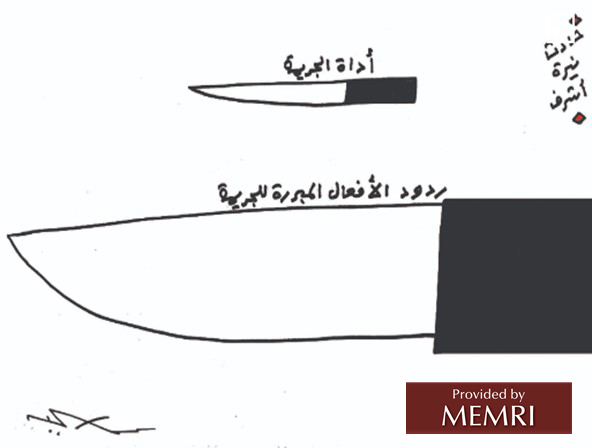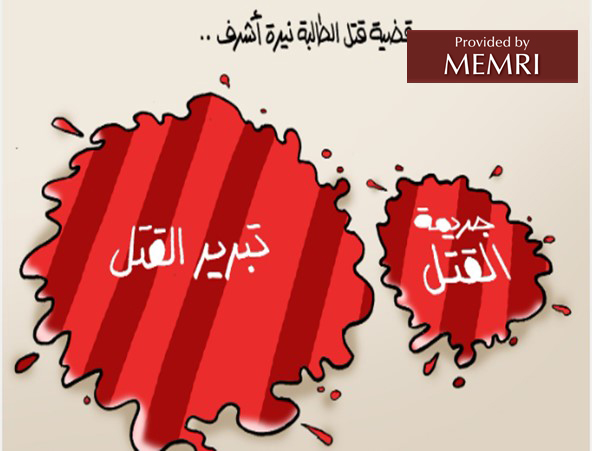20 czerwca 2022 r. Naira Al-Aszraf, egipska studentka, została zasztyletowana przez kolegę studenta, Muhammada 'Adela, u bram Uniwersytetu Mansoura w północnym Egipcie, po tym, jak odrzuciła jego zaloty i odmówiła poślubienia go. Kilka dni później podobny incydent miał miejsce w Jordanii, na Uniwersytecie Nauk Stosowanych w Ammanie, kiedy studentka imieniem Iman Arszid została zamordowana w podobnych okolicznościach. [1]
Zamordowanie Nairy Al-Aszraf wywołało szok i oburzenie w Egipcie, ale byli też tacy, którzy usprawiedliwiali zbrodnię, twierdząc, że Al-Aszraf nie nosiła hidżabu (zasłony). Wyróżniał się wśród nich islamski kaznodzieja Mabrouk 'Attia, dawniej dziekan wydziału szariatu Al-Azhar, a obecnie wykładowca na Uniwersytecie Al-Azhar. W wideo, które zamieścił na Facebooku po morderstwie, stwierdził, że kobiety, które nie chcą zostać zamordowane, powinny temu zapobiec, ubierając się skromnie. Powiedział: „Kobiety noszą hidżab, aby pozostać przy życiu. Noszą luźne ubrania, aby uniknąć kuszenia [mężczyzn]. Jeśli cenisz swoje życie, musisz wyjść z domu w szerokiej, a nie obcisłej odzieży i nie nosząc spodni lub z włosami rozpuszczonymi wokół policzków. Jeśli to zrobisz, jakiś zaśliniony mężczyzna może cię zobaczyć i zamordować. To jest fakt.”[2] Niektórzy egipscy użytkownicy mediów społecznościowych usprawiedliwiali wypowiedzi Attii i samego mordercę, a nawet uruchomili hashtag: „Muhammad Adel jest ofiarą, a nie przestępcą”. [3]
Wielu innych Egipcjan zareagowało z furią na stanowisko 'Attii i jego zwolenników. Nazwali to obwinianiem ofiary, usprawiedliwianiem przemocy wobec kobiet, a nawet morderczym podżeganiem. Narodowa Rada Kobiet złożyła skargę na Attię do prokuratora generalnego o podżeganie do morderstwa. Dziesiątki dziennikarek i aktywistek podpisały komunikat ostrzegający przed podżeganiem wobec kobiet i usprawiedliwianiem przemocy w mediach społecznościowych. Wyraziły obawę, że same mogą być następną ofiarą, i wezwały prokuratora generalnego Egiptu, by położył kres nienawistnemu dyskursowi. W mediach społecznościowych pojawiły się hashtagi, takie jak „Jestem następną ofiarą” i „Prawo Nairy”. [4]
Uniwersytet Al-Azhar wydał oświadczenie, w którym odrzucił stanowisko Attii, nazywając je jego „osobistą opinią, która jest sprzeczna z szacunkiem Al-Azhar dla kobiet i środkami, jakie [Al-Azhar] podjął w celu ochrony ich praw i wzmocnienia ich pozycji”. [5] Globalne Centrum Fatwy Al-Azhar wydało oświadczenie, że „ocenianie moralności kobiety na podstawie tego, czy nosi zasłonę, jest sprzeczne z religią” i że „używanie zasłony jako pretekstu do atakowania kobiet jest poważną i naganną zbrodnią”.[6] Dar Al-Ifta, oficjalny urząd fatw w Egipcie, również potępił oświadczenia Attii, nie wymieniając go z imienia i nazwiska, mówiąc: „Skłonność niektórych samozwańczych [kaznodziejów] do znajdowania związku między atakiem, nękaniem lub mordowaniem młodych kobiet a faktem, że nie nosiły zasłony, jest równoznaczny z mową nienawiści… i podżeganiem do atakowania kobiet…” [7]
W odpowiedzi na publiczne oburzenie jego wypowiedziami Attia opublikował kolejne wideo, w którym stwierdził, że nie zaatakował Nairy Al-Aszraf ani nie wspomniał o jej sposobie ubierania się. Dodał, że w rzeczywistości modlił się za duszę Nairy i miał nadzieję, że morderca otrzyma sprawiedliwą karę, na jaką zasłużył. „To była naganna i ohydna zbrodnia – powiedział. – Nie noszenie zasłony nie jest usprawiedliwieniem dla morderstwa. [tylko] powiedziałem, że zasłona chroni [kobiety] i zmniejsza przypadki [ataków na nie]”. Oznajmił również, że zawiesił swoją działalność w mediach społecznościowych. [8]
Krytykę wypowiedzi Mabrouka 'Attii podjęła również prasa egipska. Wiele artykułów ostro atakowało go za powiązanie kobiecych ubiorów z przypadkami morderstw i ostro krytykowało społeczeństwo egipskie za dopuszczenie do tego, by takie ekstremistyczne myślenie przeniknęło do systemu edukacji i innych instytucji. Wzywano do zajęcia się źródłem problemu, aby powstrzymać podżeganie wobec kobiet i zapobiec kolejnemu morderstwu.
[Dalszy tekst – fragmenty niektórych z tych artykułów – nie jest spolszczony]

Cartoon in London-based daily: A man proposes marriage to a Woman at Gunpoint (Al-Arabi Al-Jadid, London, June 26, 2022)
Egyptian Liberal: Mabrouk 'Attia Represents An Extremist Ideology That Has Become Entrenched Among Us; We Must Fight It
Liberal journalist Khaled Montasser wrote in his column in the daily Al-Watan that the problem is not Mabrouk 'Attia himself, but the fact that he represents a mentality prevalent in Egypt and that there are millions who think like him, including in government positions and in the education system. He called to place the issue at the top of the agenda and treat the roots of the problem. He wrote: „When Sheikh Mabrouk withdrew [from social media] people were happy… and thought that the war on fundamentalism was over. [But] I believe that this war has [just] begun, because Mabrouk is not just one man. He [represents] a movement, a phenomenon… And even if Mabrouk has withdrawn [from social media], what about all the other Mabrouks who welcome [his statements]? They penetrate the education system and our brains…
Mabrouk has withdrawn from the media, but will he withdraw from lecturing? An even if he does, we have millions of others in administrative positions who have the same mentality. They speak from their pulpits in the same language, enter classrooms to brainwash children with the same kind of talk, and play the same role as he does in universities, in commercial companies and in factories. This is a mentality that infiltrates [society] and waits for an opportunity to take over. Many murderers are just waiting for an opportunity, although currently they are still hiding [their intentions]. There are evil people living among us, as the President says, and the war against them is more important than the war against the external enemy, who has particular characteristics and is found in particular places, whereas they live among us and look like us…
„Mabrouk [’Attia] may have withdrawn, but his mentality persists. There are still people who identify [with him], and justify crimes [like] murder, bombings and suicide operations!! The war is against the fetid swamp in our own backyard, not against the swarms of flies [it nurtures], which come in through the windows and we must swat them away… As long as the ideological swamp remains active, the flies will continue laying their eggs there, and larva will hatch out of them carrying rot, illness and death.
„Our national discourse must give priority to [the question of] what has happened to the Egyptian mind. Why has it become so susceptible to believing fairytales and to justifying violence with such ease…? How did this virus infect the Egyptian mind and how shall we treat it? What is the preventive inoculation and the treatment protocol?
„For years, Mabrouk fascinated viewers and became trendy, and we were bewildered, but did not ask [ourselves] how he had managed take over people’s minds and gain such a following. Had we pondered [this phenomenon], understood it and addressed it, we would not have come to the point where he dares to incite against unveiled women and demand that every women cover herself [from head to toe] in order to protect herself against murder…
„Mabrouk left or has been expelled [from social media], but the terrorist thinking has not been expelled… Isolating the virus and understanding its structure will help the doctors to treat it. Have we eliminated the real mental virus, or [only] one of its variants?”[9]


Egyptian press cartoons: Responses that justify the murders are more dangerous than the murders themselves (Al-Masri Al-Yawm, Egypt, June 23, 2022; Al-Yawm Al-Sabi’, Egypt, June 27, 2022)
Egyptian Journalist: „Enough With The Oppression, Sadism And Fascism Over A Headscarf”
Al-Watan columnist Sahar Al-Ga’ara sharply criticized Mabrouk 'Attia, stating that, instead of preaching tolerance, as a cleric should, he permitted the killing of unveiled women, an act no less grave than accusing them of heresy. She wrote: “Did Niara Ashraf have to be butchered at the university gates for us to stand up and demand to silence the 'trumpets of incitement’ that spread hatred and contempt for women, encourage violence against them and call for terror against women who do not don the veil? Who knows how many Nairas we must sacrifice to the idols of fanatic religious demagogy and to the social media clowns and frauds who erode the security and social soundness of the homeland? [They do this] just in order to gain the title of 'influencer’ or make millions from their contemptuous videos that shamelessly discuss women’s honor under the title of 'there is no shame in religion.’ How many Nairas have to die so that one preacher will leave [social media]?…
„For Mabrouk 'Attia… the pure blood of Naira – whose [memory] every decent human being should treat with silent respect – was not enough. He saw [her death] as an opportunity to divide the nation and tear the social fabric by loudly disparaging Egyptian women who do not wear the veil, in a show that can be described, at the very least, as flaying the victim and cutting her to pieces with false and fabricated accusations…
„We are facing a paradoxical social situation where, instead of preaching tolerance and grace, a religious preacher decides to divide women into two categories: the ones who wear the veil and [thus] enjoy security, and the unveiled ones, who can be killed if they do not happen to be covered from head to toe. He has forgotten that Egypt has religious pluralism. Can you imagine the situation that Egypt’s Christian women are facing, now that they are exposed to terror? Mabrouk tried to drag us into a religious arena and enlist his viewers’ help in the [fight] against women, using the veil [as an excuse]. This is another accusation, an accusation of heresy. He shamelessly used the veil to slander any woman who opposed him, presenting her to society as an 'infidel secularist.’ This is an old, idiotic and obvious game…
The Sheikh of Al-Azhar has already ruled that not wearing the veil does not exclude [a woman] from the fold of Islam.[1] The veil is not the sixth pillar of Islam, and some hold that it is neither a [Islamic] custom nor a commandment. The Sheikh of Al-Azhar said that neglecting [to wear it] is merely a transgression. But forcing women to wear a Taliban-style veil or an Iranian chador is not just an absurdity but a threat to public safety…
Enough with the oppression, sadism and fascism for the sake of a headscarf. Begone, preacher. May Allah not bless you.”[2]
Egyptian Writer: The Extremist Clerics Are The Ones Who Objectify Women
In her column in Al-Masri Al-Yawm, Fatima Na’out, an Egyptian poet and journalist, condemned the clerics who objectify women and blame incidents of assault on the victim’s appearance. She urged to fight this mentality, calling it terrorist: „As usual, the so-called clerics appear whenever a [an issue concerning] woman comes up, but disappear when there are disasters, epidemics, poverty, disease, world wars and national [crises]. There is a strange connection between their showing up and [the issue] of the woman’s body. The only thing that grabbed their attention in this resounding tragedy that broke Egypt’s heart was the fact that the young murder victim did not wear a veil! They regarded this as the reason for the murder! As fate would have it, two days after Naira’s death a similar ugly crime occurred in Jordan. The victim was a student named Iman Arshid, who was murdered by a fellow student for the same reason: she rebuffed his burning love. The only difference between the two victims was the Jordanian martyr did wear the veil. It was as though fate wanted to silence those who go to extremes in their religious discourse and actions, and [demonstrate] that the crime [of murder] is blind and does not care whether the woman’s hair [is covered or not], and that this distinction exists only in the minds of the so-called clerics.
„One of those [preachers] who go to extremes in their religious discourse and actions [although] religion has nothing to do with them said that 'the reason for the crime was the objectifying of women in [television] dramas and films…’ This begs the question: Who is it that objectifies women and turns them into cheap commodities that can be bought and sold? Is it drama and art, which are valuable and encourage women to excel, work, prove themselves, rely on themselves and face society with determination and self-respect? Or is it the extremists and terrorists whom we saw with our own eyes selling women hostages in slave markets in all the areas taken over by ISIS, Boko Haram, the Taliban and the other organizations of takfir, degradation, murder and distortion of religion? Who objectifies women and degrades their humanity? A drama series like „Illa Ana” [„Just Me”],[3] in which young heroines who face social, psychological and health issues endure and succeed? Or the preacher who calls to harass and hurt a woman who does not wear the veil, regardless of her religion? I do not understand how this man has not been arrested after uttering these intimidating statements.”[4]
Bahraini Columnist In Egyptian Daily: „We Must Place The Issue Of Women’s Status At The Top Of The Agenda”
Bahraini journalist Khawla Matar, a columnist for the Egyptian daily Al-Shurouq, wrote that Arab societies must stop marginalizing the issue of women’s status, and also reexamine their education systems and take practical measures to change the situation. She wrote: „Studies published by the relevant research centers stress that physical and sexual assault on women has nothing to do with what they wear, or with so called 'immodest appearance.’ On the contrary, many women who do wear the hijab and niqab experience more harassment [than those who don’t], on the street, on public transportation, at the beach, at the cinema, in coffee shops and in every [public] space. [These spaces] are open to everyone, but not to women, who have to think hard before gathering the courage and the mental strength to bravely realize their basic right as human beings…
„These incidents [of murder] were not random. This is a social rift that will exact a heavy price from us for generations to come, and the victims will mostly be women. Whereas some countries had revolutions and uprisings [that caused them to] reconsider the status of women, in [other countries] this issue, and society’s treatment of women, remain far removed from any reexamination… Let us genuinely reexamine the education system, not because this a demand of the new 'friends and allies’ of some of our countries, but in order to restore to Arab women their dignity and their rights as human beings. [Let us] stop the ignorant clerics, instead of scrutinizing peaceful political associations. It would also be beneficial if families reconsidered the way they bring up their daughters and sons. The solutions are clear, simple and easy, if only the decision-makers, who pay a bunch of media figures to condemn [the murders], would [start] doing something other than voice condemnations for several hours and then forget all about [the incident] until the next woman is murdered, and then another and another, like sheep [slaughtered] for the holiday.”[5]
[1] This is apparently a reference to statements made several years ago by the Sheikh of Al-Azhar, Ahmad Al-Tayyeb, on a television program, in which he said: „[Wearing] the hijab, namely covering the head and the hair, is a commandment incumbent on all Muslim women. It is mentioned in the Honorable Qur’an, and the entire [Islamic] nation agrees on it. [However,] it is forbidden to claim that a woman who does not wear the veil has left the fold of Islam. According to [Islamic] law, she is [merely] inobedient. Failing to wear the veil is a transgression, like any other. It is not one of the grave transgressions. It is less grave, for example, than lying.” Al-Tayyeb’s statements were recently quoted in the Egyptian press following Al-Ashraf’s murder. See e.g., Al-Watan (Egypt), June 24, 2022.
[2] Al-Watan (Egypt), June 23, 2022.
[3] An Egyptian television series that has been running since 2020 and presents the real-life stories of Egyptian women facing various social and other challenges.
[4] Al-Masri Al-Yawm (Egypt), June 27, 2022.
[5] Al-Shurouq (Egypt), July 3, 2022.








